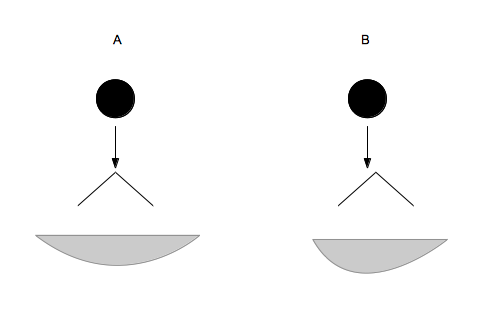In classical physics, all the motion of the objects and the behavior after all the recoils is predictable in principle. In practice, there's always some dependence on tiny errors in the knowledge of the initial state; tiny velocities that the elements may have and the motion and rotation of the marble in particular; tiny non-uniformities in the shape of the elements, and so on. The required accuracy in the knowledge of all these things is "exponential" (the error has to be at most $\exp(-X)$ where X is a number much greater than one) if we want to be able to predict the evolution for a long time, e.g. in a tall enough Galton box.
So in practice, the motion isn't predictable, much like it's not predictable when one is throwing dice. The precise behavior of the balls etc. may be described by probabilistic distributions whose width takes the "possible errors" produced in the real world into account. When several such probability distributions are convoluted, one gets some random distribution for the result. The Galton box is an example of that.
In quantum mechanics, one can't even imagine that there exists some sharp, non-probabilistic answer. Even if one knew everything about the objects perfectly, the final state would be undetermined – ambiguous – and only probabilities of different answers could be predicted. While this difference between classical physics and quantum mechanics seems "qualitative" in principle, it is very modest in the operational sense. Even in classical physics, due to the error margins etc., one should have adopted the fact that only probabilistic predictions were possible. Quantum mechanics takes this observation seriously and creates a framework for physics in which the precise deterministic predictions are non-existence not even in practice but even in principle. However, the ways how to calculate the probabilities are pretty much analogous.

